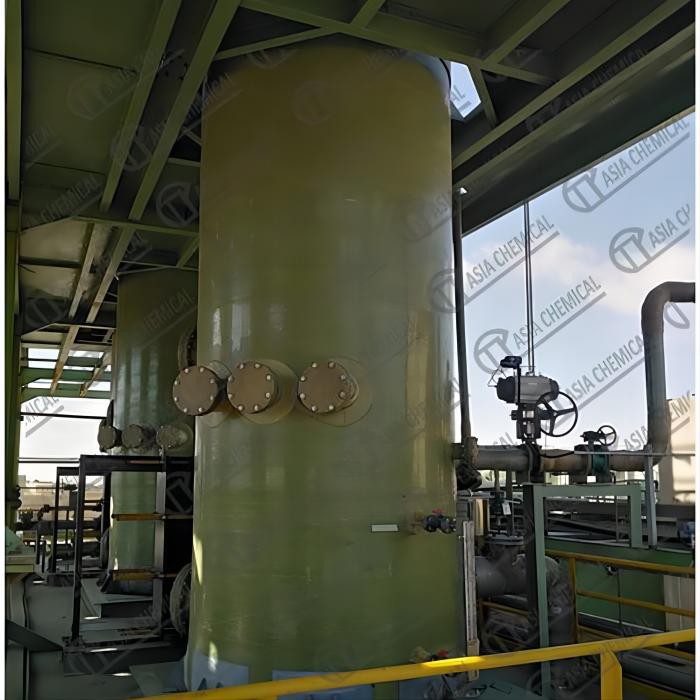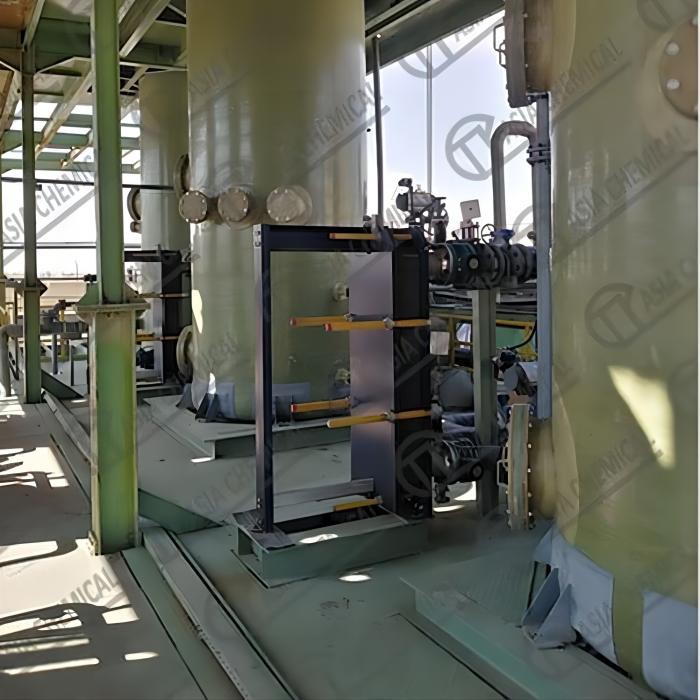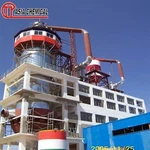Hangzhou ASIA Chemical Engineering Co., Ltd. is one of the most reliable manufacturers and suppliers of calcium chloride plants in China. Please rest assured to wholesale cost-efficient calcium chloride plants from our factory. Good service and reasonable price are available.
Calcium chloride, a versatile chemical compound with various industrial applications, is produced in calcium chloride plants. Here's an overview of this product and its manufacturing process:
Product Overview:
1. Chemical Formula:Calcium chloride is a chemical compound with the formula CaCl₂. It is composed of one calcium (Ca) atom and two chlorine (Cl) atoms.
2. Physical Properties:Calcium chloride is a white crystalline solid at room temperature. It has a high solubility in water and is deliquescent, which means it can absorb moisture from the atmosphere, forming a solution. This property makes it useful for de-icing and dust control applications.
3. Types of Calcium Chloride:
Anhydrous Calcium Chloride (CaCl₂):It is the anhydrous form, typically available as pellets, flakes, or powder.
Calcium Chloride Dihydrate (CaCl₂·2H₂O):This is the hydrated form, often used in de-icing applications. It contains two molecules of water for every molecule of calcium chloride.
Manufacturing Process:
The production of calcium chloride involves several methods, but the most common is the reaction between calcium carbonate (CaCO₃) and hydrochloric acid (HCl). The general steps are as follows:
1. Raw Materials:The primary raw materials are limestone (CaCO₃) and hydrochloric acid (HCl). Limestone is heated to produce quicklime (CaO), which is then hydrated to form calcium hydroxide (Ca(OH)₂).
2. Reaction:Calcium hydroxide is reacted with hydrochloric acid to produce calcium chloride and water. The chemical equation is:
Ca(OH)₂ + 2HCl → CaCl₂ + 2H₂O
3. Purification:The resulting calcium chloride solution is purified to remove impurities and by-products.
4. Drying:If anhydrous calcium chloride is the desired product, the solution is evaporated, leaving behind solid calcium chloride crystals.
Related ProductsRelated Products
Product Application Field: 1. For daily use disinfection, such as home use, swimming pool disinfection. 2. It is used for disinfection and sterilization of tap water. 3. Used for bleaching in paper making and textile industry.
Disinfection Liquid Production Plant manufactures solutions, like bleach or disinfectants, used for killing or inhibiting the growth of microorganisms to maintain hygiene and prevent disease transmission.
Calcium Chloride Plants: Benefits and Applications
Calcium chloride plants are a crucial part of the chemical engineering industry, producing a compound widely used in various industries such as food, pharmaceuticals, and construction. Calcium chloride is a versatile compound that can be used as a de-icing agent, food preservative, and even in concrete construction. In this blog post, we will delve deeper into the benefits and applications of calcium chloride plants.
Benefits of Calcium Chloride Plants
One of the primary benefits of calcium chloride plants is that they produce a compound with a wide range of applications. Calcium chloride is used as an additive in numerous products, from food to de-icing agents. Additionally, calcium chloride is hygroscopic, which means it attracts moisture from the environment, making it useful in drying applications. Calcium chloride plants are efficient and cost-effective, making them ideal for large-scale production.
Another benefit of calcium chloride plants is that they are easy to maintain. Plants that use the latest technology and equipment can operate with minimal supervision and maintenance. Additionally, these plants have a long lifespan, which means that they can provide consistent production over an extended period.
Applications of Calcium Chloride Plants
De-icing: Calcium chloride is widely used as a de-icing agent during winter months. Its hygroscopic properties attract moisture and melt ice and snow, making it an effective alternative to traditional salt.
Food preservation: Calcium chloride is used in the food industry as a preservative and firming agent. It helps prevent spoilage and extends the shelf life of food products. Calcium chloride is also used to increase the calcium content of certain food products such as canned vegetables.
Concrete construction: Calcium chloride is used as an accelerator during the production of concrete. It helps to speed up the curing time of concrete, allowing for faster construction and reduced costs.
Drying applications: Calcium chloride's hygroscopic properties make it ideal for drying applications such as in the production of desiccants. It is also used in the drying and maintenance of refrigeration systems.
Conclusion
In conclusion, calcium chloride plants are an essential part of the chemical engineering industry, producing a compound with a wide range of applications. Calcium chloride is used as a de-icing agent, food preservative, and even in concrete construction. Its hygroscopic properties make it ideal for drying applications as well. With the latest technology and equipment, calcium chloride plants are efficient, cost-effective, and easy to maintain. As industries continue to evolve, the demand for calcium chloride is set to rise, making calcium chloride plants more important than ever before.
Products Advantage Description
Asian chemical engineering company
Our Asian chemical engineering company stands at the forefront of the industry, employing cutting-edge control technology and state-of-the-art equipment to serve our esteemed clients.
What sets us apart is our highly experienced engineering and installation team, boasting decades of expertise, with many team members accumulating over 40 years of invaluable work experience.

Excellent quality control: We have strict control standards for product quality. Through advanced quality management systems and laboratory equipment, we ensure that the calcium chloride products we produce meet international standards and perform with excellence in various applications.
Large-scale production capacity: Our production factory adopts the latest production technology and automation equipment, and has the ability to produce large-scale products to ensure that customers receive stable supply.
Diversified Product Line: We offer various types of calcium chloride products, including anhydrous calcium chloride and calcium chloride dihydrate, to meet the needs of different industries and application fields.

Sustainable production: We pay attention to environmental protection and adopt environmentally friendly production methods to minimize the impact of the production process on the environment and comply with international sustainability standards.
Customer-Oriented Solutions: We actively listen to customer feedback and flexibly adjust product specifications and packaging methods according to their specific needs.
Timely supply and global market coverage: We have established a reliable supply chain to ensure timely delivery, not only meeting the needs of the domestic market, but also exporting to international markets, providing high-quality calcium chloride products and services to global customers.
FAQ
What is a Calcium Chloride Plant?
How is calcium chloride produced in these plants?
What are the main applications of calcium chloride produced in these plants?
What advantages does calcium chloride offer as a de-icing agent?
Is calcium chloride environmentally friendly?
What types of calcium chloride are produced in these plants?
How does calcium chloride improve the cold-weather performance of concrete?
In the food industry, what role does calcium chloride play?
What are the benefits of using calcium chloride in the oil and gas industry?
Is the production of calcium chloride a sustainable process?
What is the role of calcium chloride in pharmaceuticals?
How does calcium chloride work as a desiccant in refrigeration and air conditioning?
Can calcium chloride be customized for specific industrial needs?
Is the demand for calcium chloride increasing globally?
What are some challenges in the production of calcium chloride?
What are the potential environmental impacts of calcium chloride production?
How does calcium chloride help in natural gas and oil production?
Is calcium chloride considered safe for consumer use, such as in the food industry?
What are the international standards and regulations governing calcium chloride production?
What innovations are on the horizon for calcium chloride production and its applications?
What is a Calcium Chloride Plant?
A Calcium Chloride Plant is a facility that manufactures calcium chloride, a chemical compound with various industrial applications. It's used for de-icing, dust control, and in industries like oil and gas, construction, and food.
How is calcium chloride produced in these plants?
Raw Material Preparation: Limestone, a common source of calcium carbonate, is initially heated to produce quicklime (CaO). The quicklime is then hydrated to form calcium hydroxide (Ca(OH)₂).
Reaction: Calcium hydroxide is mixed with hydrochloric acid. This reaction results in the formation of calcium chloride (CaCl₂) and water (H₂O). The chemical equation representing this reaction is:
Ca(OH)₂ + 2HCl → CaCl₂ + 2H₂O
Purification: The resulting calcium chloride solution may contain impurities and by-products. It undergoes a purification process to remove these unwanted substances, ensuring the final product's purity.
Drying (Optional): If anhydrous calcium chloride is the desired product, the solution may be further processed to remove the water content, resulting in solid calcium chloride crystals.
What are the main applications of calcium chloride produced in these plants?
The applications include de-icing roads, oil and gas drilling, construction, food production, pharmaceuticals, and as a desiccant in various industries.
What advantages does calcium chloride offer as a de-icing agent?
Calcium chloride is effective at lower temperatures than traditional salt, making it a powerful de-icing agent. It also reduces dust and is less corrosive to infrastructure.
Is calcium chloride environmentally friendly?
While it's effective for de-icing, excessive use can have environmental impacts. Proper application and management are essential to minimize adverse effects.
What types of calcium chloride are produced in these plants?
Calcium chloride plants produce anhydrous calcium chloride and calcium chloride dihydrate, each suitable for specific applications.
How does calcium chloride improve the cold-weather performance of concrete?
Calcium chloride is added to concrete to accelerate curing, making it set faster and gain early strength, which is crucial in cold weather construction.
In the food industry, what role does calcium chloride play?
Calcium chloride is used in food processing, primarily in cheese production and beer brewing. It acts as a firming agent and a source of calcium ions.
What are the benefits of using calcium chloride in the oil and gas industry?
In this industry, it helps control clay swelling in drilling fluids and acts as a dehydrating agent in gas and oil production, improving overall efficiency.
Is the production of calcium chloride a sustainable process?
The production process can be sustainable if managed responsibly, minimizing environmental impacts and ensuring proper disposal of by-products.
What is the role of calcium chloride in pharmaceuticals?
Coagulant: Calcium chloride is used in the coagulation and setting of certain types of gels, particularly in the production of gelled capsules, where it helps create a stable and uniform gel structure.
Medicinal Products: It can be utilized as an additive in antacids and oral rehydration solutions to provide a source of essential calcium ions, aiding in the treatment of calcium deficiencies.
Medicinal Chemistry: In some pharmaceutical research and development processes, calcium chloride may be used in chemical reactions as a catalyst or reagent to modify molecular structures.
Buffer Solution: Calcium chloride can be incorporated into buffer solutions to maintain a stable pH environment, which is crucial in various pharmaceutical formulations and laboratory applications.
Excipient: It can serve as an excipient or pharmaceutical auxiliary substance in tablet and capsule formulations, helping to control the release of active pharmaceutical ingredients.
Pharmaceutical Salts: Calcium chloride can be used to form specific pharmaceutical salts for various drug formulations, ensuring the proper solubility and bioavailability of drugs.
Topical Applications: In topical pharmaceutical formulations, calcium chloride may be included for its astringent properties and its ability to assist in wound care and skin treatments.
How does calcium chloride work as a desiccant in refrigeration and air conditioning?
It absorbs moisture from the air, preventing humidity-related issues like frost and ice formation within refrigeration and air conditioning systems.
Can calcium chloride be customized for specific industrial needs?
Yes, manufacturers can tailor calcium chloride products to meet the specific requirements of different industries and applications.
Is the demand for calcium chloride increasing globally?
Yes, the demand is growing due to its diverse applications, especially in the context of sustainability and the need for eco-friendly de-icing solutions.
What are some challenges in the production of calcium chloride?
Challenges may include managing the environmental impact of the production process and ensuring the safe handling of chemicals involved.
What are the potential environmental impacts of calcium chloride production?
If not managed properly, the production process can have environmental consequences, including water and soil contamination.
How does calcium chloride help in natural gas and oil production?
It is used to remove water from natural gas and oil, preventing corrosion and blockages in pipelines and equipment.
Is calcium chloride considered safe for consumer use, such as in the food industry?
Yes, when used in compliance with food safety regulations, it is considered safe for consumers.
What are the international standards and regulations governing calcium chloride production?
Various regulations exist, including those related to chemical handling, environmental protection, and product quality, depending on the region.
What innovations are on the horizon for calcium chloride production and its applications?
Ongoing research focuses on improving production efficiency, environmental sustainability, and finding new applications for calcium chloride in a rapidly evolving industrial landscape.
Hot Tags: calcium chloride plants, China, manufacturers, suppliers, factory, wholesale, price, profession, cost, Chlorine Allied Plant, High Strength Sodium Hypochlorite Plant, Sodium Hypochlorite production line, NaClO2 Plant, Sodium Chlorite Manufacturing Plant, Chlorine Allied Production Plant












